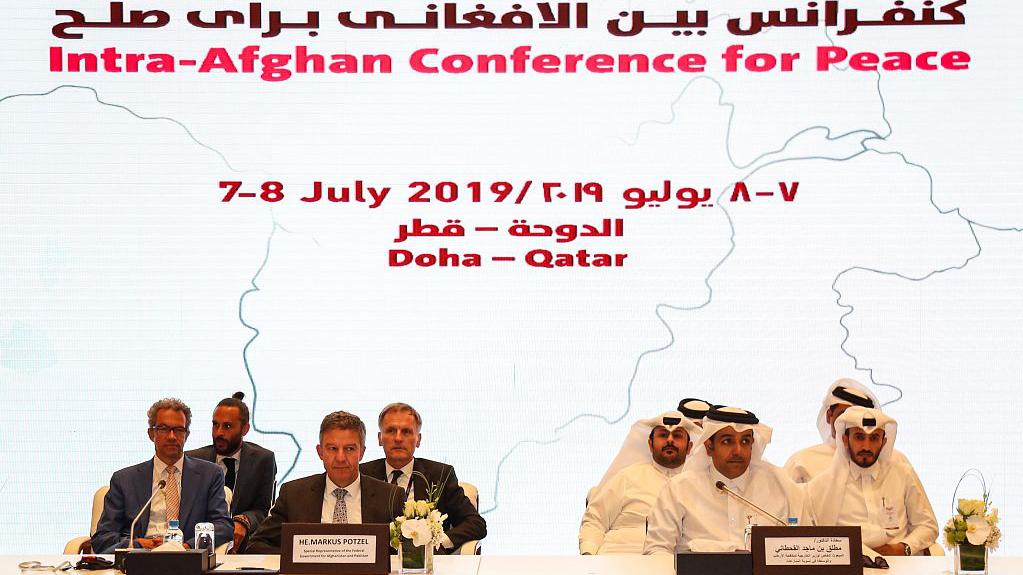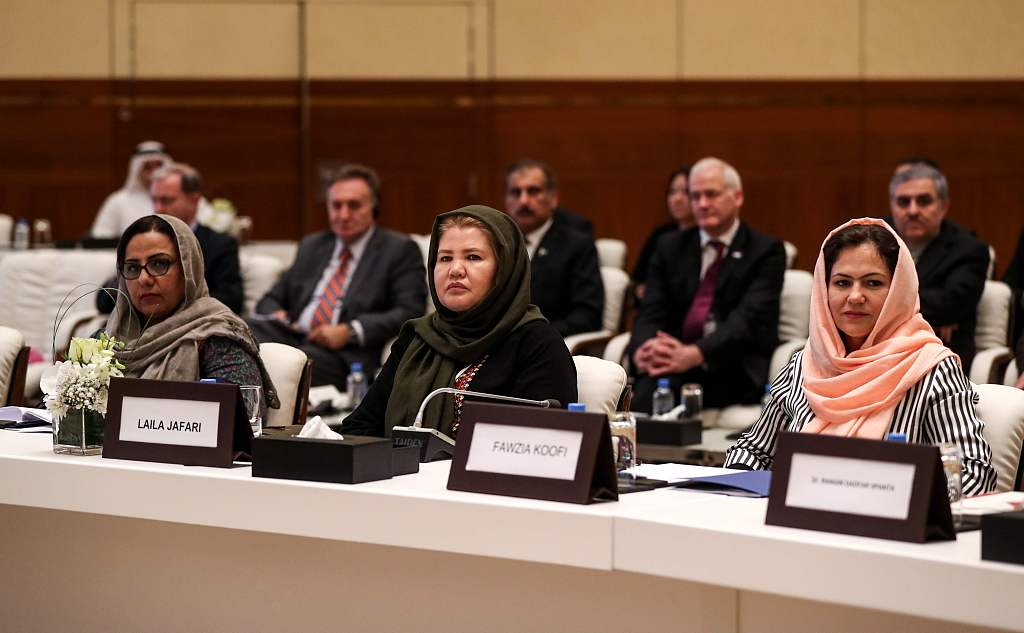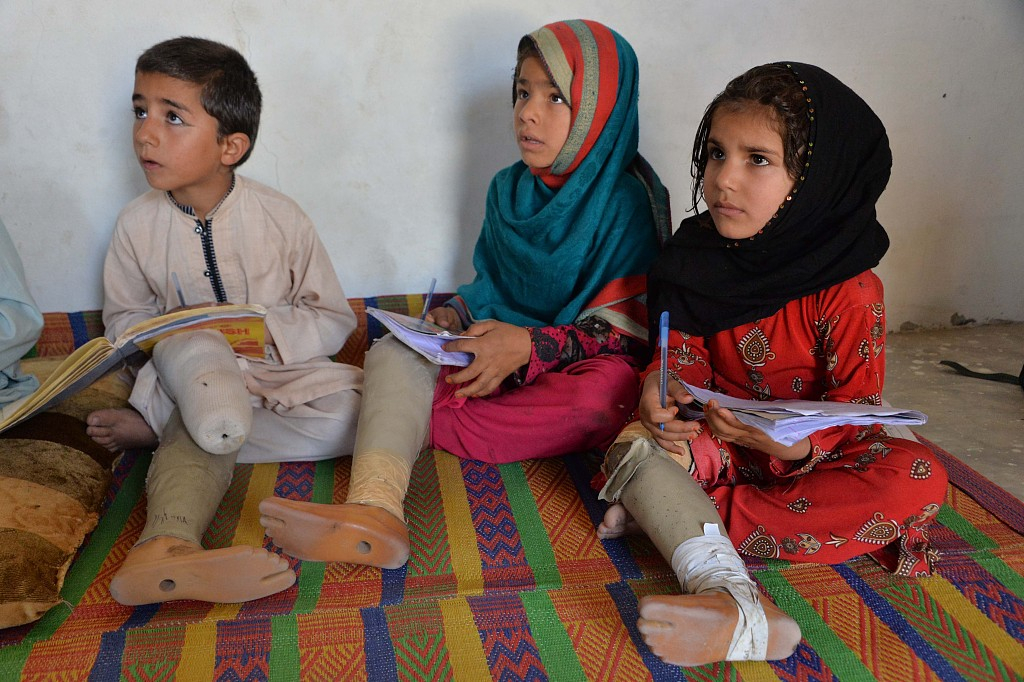

Editor's note: Azhar Azam writes on domestic, regional and global issues. The article reflects the author's opinions, and not necessarily the views of CGTN.
Despite the Trump administration's desperate efforts to decode a peace deal with the Taliban before the Afghan presidential election in September and dispose of the war-torn country, the U.S. is caught up in the landlocked South-Central Asian country.
Nevertheless, the Afghan peace process wigwagged some breakthrough as the Taliban met their domestic rivals in a co-organized dialogue by Germany and Qatar.
Although the armed group is apathetic about holding direct talks with the Kabul administration, considering it a "puppet regime" of the U.S., still it was a prodigious success for the U.S. that would pave the way for an inclusive intra-Afghan dialogue.
Both the U.S. Special Representative on Afghanistan Reconciliation Zalmay Khalilzad and Taliban spokesperson Suhail Shaheen were elated by the progress on ending the 18-year impasse in Afghanistan. Khalilzad also appreciated Pakistan for facilitating the peace talks between the U.S. and Taliban, conceding Washington relations with Islamabad has changed "little-by-little in a positive direction".

Afghan civil society and women's rights activists attend the Intra Afghan Dialogue talks in Doha, Qatar, July 7, 2019. /VCG Photo
The negotiations were previously wedged over the Taliban's precondition to provide a timeline for U.S. troop withdrawal and the U.S. urging the armed group to give assurance that Afghanistan soil will not be used to harm other countries, announcing a countrywide ceasefire, and commit an intra-Afghan dialogue.
The remarks by the respective representatives hint that the U.S. could decide to pull out from Afghanistan in a year or so and that the Taliban would agree on a truce as well as on engagement with President Ashraf Ghani's government.
Intra-Afghan dialogue is also on the cards as the Pakistani Prime Minister is soon expected to meet a Taliban delegation in Islamabad. Days before the eighth round of peace negotiations, Pakistan hosted Afghan government officials at a scenic hill station near Islamabad.
Even though the Taliban did not participate in the talks, it would be conducive to bridge the differences between the armed group and Kabul administration. Last month, President Ghani also visited Pakistan where he thought to have requested Pakistan cooperation on intra-Afghan dialogue.
The prospect of any potential peace agreement will rely on U.S. troop withdrawal only after which the Taliban would be put under international diplomatic pressure to hold direct talks with the Afghan government.
But even if the U.S.' vision of intra-Afghan dialogue materializes, the subsequent stage would perhaps be the most challenging phase of the Afghan peace process.
This is because Afghanistan is a place that suffers from strenuous tribal disputes, deep ethnic divisions, and differentiated armed factions, so any covenant with some of them could instead fashion more complex war hotspots in the country.
Afghanistan has also been a land of insecurity and mayhem as none of the interlopers, due to their vague interests, never intended to resolve the differences between several Afghan clusters. Consequently, the situation in the battle-weary country has only degenerated and has additionally detrimentally impacted the region and the world.

Children who lost their legs following unexploded rocket explosion study at a class in their house in Khogyani district of Nangarhar province, Afghanistan, May 14, 2019. /VCG Photo
While the U.S. is ostensibly making some serious efforts to engage all the stakeholders and settle the prolonged Afghanistan issue, it shouldn't expect that all the long-battling armed groups would snub their interests to Washington's aspirations. It would indeed chomp maybe years for the U.S. to clean-out their cavernous antipathies and to tolerate each other's ascendancy.
Then there has to be a widespread rebuilding process in Afghanistan that could cost possibly around the same what the U.S. has spent in its Afghan-specific former Operation Enduring Freedom (OEF) and the ongoing Operation Freedom's Sentinel (OFS).
As these Overseas Contingency Operations (OCOs) have unplugged about one trillion U.S dollars from the U.S. economy, rehabilitation could be as much as the same, if not more.
In addition, the intra-Afghan dialogue is expected to fabricate enormous rows among Afghan all stakeholders such as how to govern the country, which system should be followed, how the resources will be distributed, what will be the pooled foreign policy, and who would have greater influence over Afghan military.
So, patience is the key to an Afghan peace dialogue. The U.S. must not haste or get dismayed over the much-anticipated differences and must ensure that all the partakers carry on engagements. Only frequent interactions could help in calming down tensions among all sides.
On the other hand, the Taliban has ramped up militant attacks in Afghanistan at speed, the U.S. would have wished for the Afghan peace process. Taliban surely are using the attacks as a bargaining chip to dominate the peace talks. The U.S. needs to finalize a draft agreement with the Taliban as a minimum so that casualties could be shirked immediately.
The Afghan peace process is going to be a tough and lengthy task that could ingest hectic efforts that will take years to yield. So, if the U.S. is vying for sustainable peace and stability in Afghanistan, it would have to unbar the peace process with time constraints and must strive for more and more intra-Afghan engagements.
Optimistically, all Afghanistan segments will someday realize how to overcome disputes and synchronize their efforts for a peaceful and stable Afghanistan.
(If you want to contribute and have specific expertise, please contact us at opinions@cgtn.com)

Copyright © 2018 CGTN. Beijing ICP prepared NO.16065310-3
Copyright © 2018 CGTN. Beijing ICP prepared NO.16065310-3